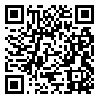Volume 16, Issue 2 (Jun 2022)
payavard 2022, 16(2): 102-112 |
Back to browse issues page
Ethics code: IR.SKUMS.REC.1400.136
Download citation:
BibTeX | RIS | EndNote | Medlars | ProCite | Reference Manager | RefWorks
Send citation to:



BibTeX | RIS | EndNote | Medlars | ProCite | Reference Manager | RefWorks
Send citation to:
Roshanzadeh M, Shirvani M, Tajabadi A, Khalilzadeh M H, Mohammadi S. The Clinical Learning Challenge of Surgery Technologist Students: A Qualitative Content Analysis. payavard 2022; 16 (2) :102-112
URL: http://payavard.tums.ac.ir/article-1-7252-en.html
URL: http://payavard.tums.ac.ir/article-1-7252-en.html
Mostafa Roshanzadeh1 
 , Mina Shirvani2
, Mina Shirvani2 
 , Ali Tajabadi3
, Ali Tajabadi3 
 , Mohammad Hossein Khalilzadeh2
, Mohammad Hossein Khalilzadeh2 
 , Somayeh Mohammadi *
, Somayeh Mohammadi * 
 4
4

 , Mina Shirvani2
, Mina Shirvani2 
 , Ali Tajabadi3
, Ali Tajabadi3 
 , Mohammad Hossein Khalilzadeh2
, Mohammad Hossein Khalilzadeh2 
 , Somayeh Mohammadi *
, Somayeh Mohammadi * 
 4
4
1- Assistant Professor, Department of Nursing, School of Nursing Borojen, Shahrekord University of Medical Sciences, Shahrekord, Iran
2- Instructor, Department of Nursing, School of Nursing Borojen, Shahrekord University of Medical Sciences, Shahrekord, Iran
3- Assistant Professor, Department of Medical Emergency, School of Paramedicine, Sabzevar University of Medical Sciences, Sabzevar, Iran
4- Instructor, Department of Nursing, School of Nursing Borojen, Shahrekord University of Medical Sciences, Shahrekord, Iran ,s.mohammadi.nfc@gmail.com
2- Instructor, Department of Nursing, School of Nursing Borojen, Shahrekord University of Medical Sciences, Shahrekord, Iran
3- Assistant Professor, Department of Medical Emergency, School of Paramedicine, Sabzevar University of Medical Sciences, Sabzevar, Iran
4- Instructor, Department of Nursing, School of Nursing Borojen, Shahrekord University of Medical Sciences, Shahrekord, Iran ,
Abstract: (1462 Views)
Background and Aim: Clinical learning is an important part of the health field, where the student interacts with the environment and applies the learned concepts in practice. Clinical environments such as operating rooms are challenging for students due to their special complexity and can have a negative impact on their learning process. In order to identify students ‘learning challenges in the operating room environment, the present study was conducted to explain students’ experiences in the field of clinical learning challenges.
Materials and Methods: The present qualitative study was performed by contract content analysis method in 2022 in Shahrekord University of Medical Sciences. Fourteen surgical technology students were purposefully selected and data were collected using in-depth semi-structured individual and group interviews and analyzed using the Granheim and Landman approaches.
Results: The participants were interviewed over a period of 5 months. 9 face-to-face interviews were conducted with 14 participants. There were 6 individual interviews and 3 group interviews. The average duration of the interview was 30 minutes. The interviews continued until data saturation and when no new themes or categories were obtained from the interviews. The findings included a theme of “unfavorable learning environment” and three categories of “confusion in learning educational content, improper professional behavior of staff and insufficient self-confidence”. The main challenge that students faced in the field of clinical learning was the unfavorable learning environment. Conditions such as confusion in learning educational content, improper professional behavior of staff and insufficient self-confidence experienced by the students in the operating room, cause the students to find the learning atmosphere in the operating room unfavorable.
Conclusion: Improving the behavior and performance of staff and physicians in accordance with the standards of professional and ethical behavior and its regular evaluation from the perspective of students and other colleagues can play an effective role in maintaining professional conditions. Also, using experienced instructors who have the role of facilitating communication and learning of students in the operating room environment will play an effective role in reducing fear and controlling inappropriate behaviors of staff towards students. Educational officials are advised to solve the existing problems in order to improve the educational atmosphere of the operating room.
Materials and Methods: The present qualitative study was performed by contract content analysis method in 2022 in Shahrekord University of Medical Sciences. Fourteen surgical technology students were purposefully selected and data were collected using in-depth semi-structured individual and group interviews and analyzed using the Granheim and Landman approaches.
Results: The participants were interviewed over a period of 5 months. 9 face-to-face interviews were conducted with 14 participants. There were 6 individual interviews and 3 group interviews. The average duration of the interview was 30 minutes. The interviews continued until data saturation and when no new themes or categories were obtained from the interviews. The findings included a theme of “unfavorable learning environment” and three categories of “confusion in learning educational content, improper professional behavior of staff and insufficient self-confidence”. The main challenge that students faced in the field of clinical learning was the unfavorable learning environment. Conditions such as confusion in learning educational content, improper professional behavior of staff and insufficient self-confidence experienced by the students in the operating room, cause the students to find the learning atmosphere in the operating room unfavorable.
Conclusion: Improving the behavior and performance of staff and physicians in accordance with the standards of professional and ethical behavior and its regular evaluation from the perspective of students and other colleagues can play an effective role in maintaining professional conditions. Also, using experienced instructors who have the role of facilitating communication and learning of students in the operating room environment will play an effective role in reducing fear and controlling inappropriate behaviors of staff towards students. Educational officials are advised to solve the existing problems in order to improve the educational atmosphere of the operating room.
Send email to the article author
| Rights and permissions | |
 |
This work is licensed under a Creative Commons Attribution-NonCommercial 4.0 International License. |




